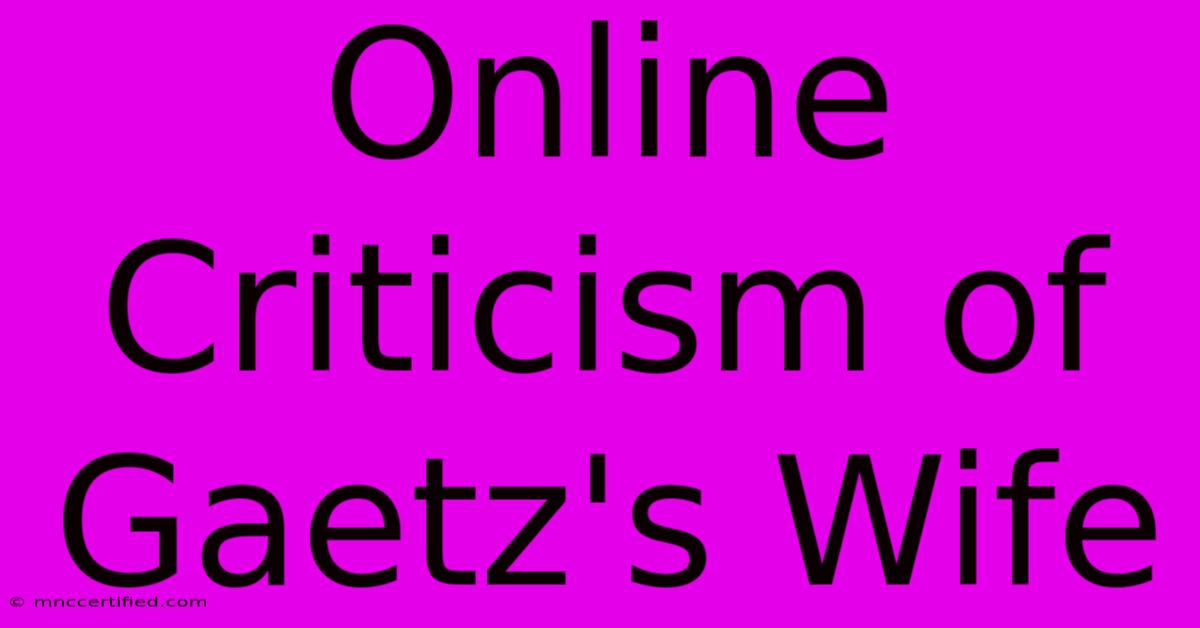Online Criticism Of Gaetz's Wife

Table of Contents
The Online Scrutiny of Rep. Matt Gaetz's Wife: A Complex Landscape
Rep. Matt Gaetz, a prominent figure in American politics, frequently finds himself at the center of public discourse. While his political stances and actions often draw criticism, the online scrutiny extends to his personal life, particularly concerning his wife, Ginger Gaetz. This article explores the nature of this online criticism, its ethical implications, and the broader context surrounding it. We will analyze the different facets of this online discussion, avoiding sensationalism while acknowledging the complexities involved.
The Nature of Online Criticism
The online criticism leveled against Ginger Gaetz is multifaceted and often intertwined with criticism of her husband's political career. It's crucial to distinguish between legitimate criticism of public figures and personal attacks. Some criticism focuses on perceived hypocrisy, contrasting her public image with her husband's actions. Others target her silence or perceived complicity in controversial matters related to her husband's political activities. It's essential to remember that she is an individual with rights to privacy, regardless of her husband's public role.
It's important to note the platform-specific dynamics. While some platforms encourage open dialogue and allow for strong opinions, others might foster a more toxic environment where personal attacks and harassment thrive. The spread of misinformation and the amplification of negativity are also significant factors in the online landscape.
Ethical Considerations and Online Harassment
The online criticism directed towards Ginger Gaetz raises significant ethical concerns. The line between constructive criticism and online harassment is often blurred, leading to harmful consequences for both the target and the broader online discourse. Cyberbullying, doxing, and the spread of false information are serious issues that demand attention. While freedom of speech is a cornerstone of democracy, this freedom does not extend to actions that constitute harassment or illegal activity.
The Role of Media and Social Media
The media plays a crucial role in shaping public perception. While responsible journalism involves holding public figures accountable, it also carries a responsibility to protect individuals from unwarranted attacks. Social media algorithms, designed to maximize engagement, can inadvertently amplify negativity and contribute to the spread of harmful content. This highlights the need for responsible media consumption and critical evaluation of online information.
Understanding the Context
Understanding the context of online criticism is crucial. The intense polarization in contemporary political discourse contributes to the environment in which such attacks flourish. The online sphere often amplifies existing societal divisions, making it more challenging to engage in constructive dialogue. Moreover, the anonymity offered by the internet can embolden individuals to engage in behavior they would not exhibit in face-to-face interactions.
Moving Forward: Fostering Responsible Online Discourse
Promoting responsible online behavior requires a multi-pronged approach. This includes:
- Media literacy: Educating individuals on how to identify misinformation and engage critically with online content.
- Platform accountability: Holding social media platforms accountable for fostering toxic online environments.
- Promoting empathy and respect: Encouraging online discussions that prioritize respect for individuals, even when disagreeing on political issues.
- Legal recourse: Utilizing available legal mechanisms to address online harassment and cyberbullying.
The online criticism directed at Ginger Gaetz serves as a case study illustrating the complex interplay between public life, personal privacy, and the challenges of navigating the digital landscape. It underscores the urgent need for a more responsible and ethical approach to online discourse. The focus should be on constructive criticism and accountability, not on personal attacks or harassment. Protecting individual privacy and fostering a healthier online environment require the collective effort of individuals, media outlets, and online platforms.

Thank you for visiting our website wich cover about Online Criticism Of Gaetz's Wife. We hope the information provided has been useful to you. Feel free to contact us if you have any questions or need further assistance. See you next time and dont miss to bookmark.
Featured Posts
-
Insurance Auto Body Mount Vernon
Nov 22, 2024
-
Grace Global Investments Pte Ltd
Nov 22, 2024
-
Captain Tom Charity Stuns Ex Boss
Nov 22, 2024
-
Adani Case Modi Government Under Scrutiny
Nov 22, 2024
-
Global Response To Netanyahu Gallant Icc Arrest
Nov 22, 2024